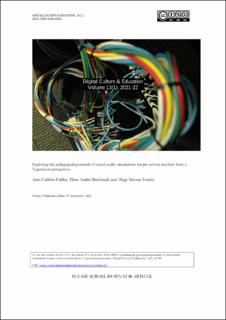Exploring the pedagogical potential of virtual reality simulations for pre-service teachers from a Vygotskyan perspective.
Peer reviewed, Journal article
Published version
Permanent lenke
https://hdl.handle.net/11250/2787613Utgivelsesdato
2021Metadata
Vis full innførselSamlinger
Originalversjon
Digital Culture and Education 2021, 13 (1), 67-80Sammendrag
This paper discusses the pedagogical potential of a flipped classroom practice in which advanced virtual reality simulations are used to place pre-service teachers in work-related situations, such as a home-school collaboration. The paper applies a Vygotskyan perspective and discusses the simulation’s potential for contributing to pre-service teachers’ professional development. The article argues that, as understood through the lens of Vygotsky’s sociocultural approach to learning, virtual reality simulations may enhance pre-service teachers’ ability to learn through imitation, while also encouraging collaborative interaction and reflection. The aim in using virtual reality simulations in the flipped classroom is to counteract the reduction of pre-service teachers to passive interpreters and teachers to the providers of prescribed curriculums. We end the article by drawing attention to the potential limitations of the simulation when used as a flipped classroom practice.
Beskrivelse
The article is also available here: https://www.digitalcultureandeducation.com/volume-13.
All articles published by DCE are made immediately available worldwide under an open access license. This means: everyone has free and unlimited access to the full-text of all articles published by DCE; everyone is free to re-use the published material provided proper accreditation/citation of the original publication is given; authors are not charged for publication of any materials. We allow the authors to retain full copyright of their articles

